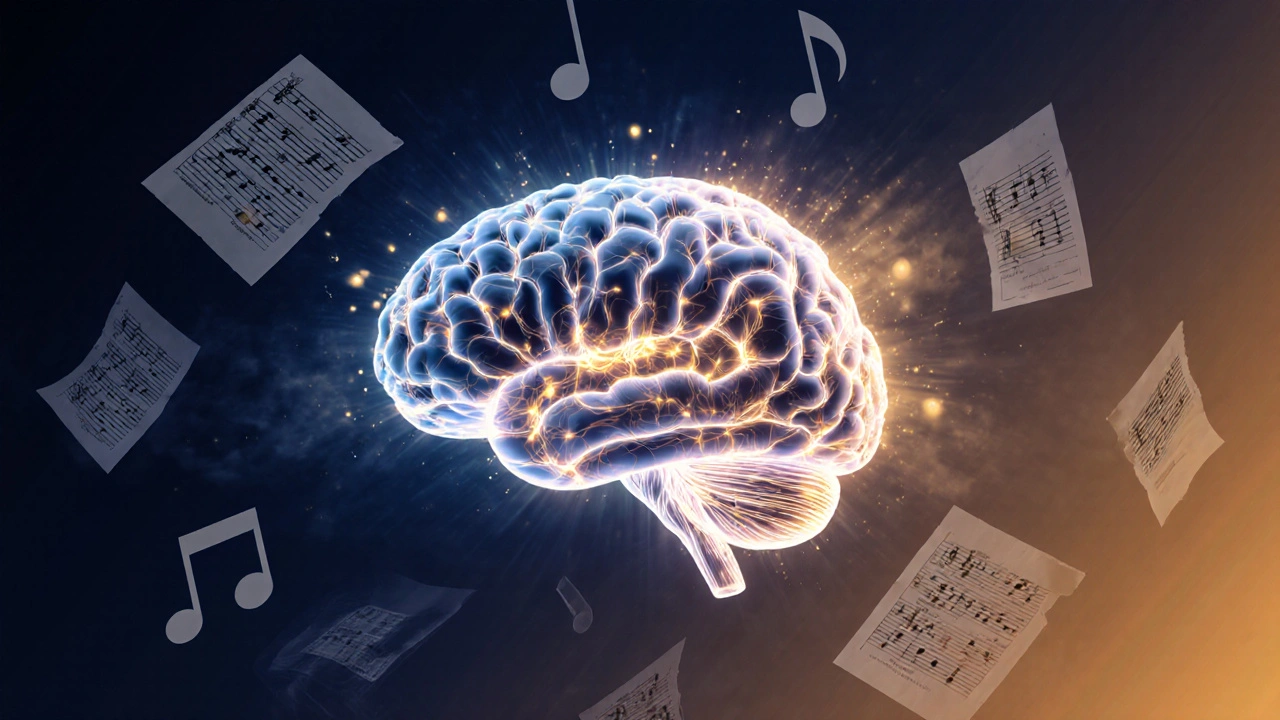Focus Music Recommender
Discover the perfect classical music for your task. Select your activity below to get personalized recommendations based on scientific research about focus and productivity.
How to Use
Play the recommended music at low volume for 20-40 minutes during your work block. Use it only for deep work sessions. After your session, take 5 minutes of silence to reset your brain.
Ever notice how CEOs, athletes, and top engineers all seem to listen to the same thing before a big meeting or workout? It’s not hip-hop. It’s not podcast noise. It’s Bach, Beethoven, or Chopin. Classical music isn’t just for concert halls and dusty libraries. It’s the quiet, powerful tool hiding in plain sight for people who want to think clearer, work longer, and perform better.
Why Your Brain Loves Classical Music
Your brain doesn’t treat music the same way it treats speech. When you hear a Mozart sonata, your prefrontal cortex lights up - the part responsible for decision-making, planning, and focus. Unlike lyrics-heavy pop songs that pull your attention into storytelling, classical music works like a silent coach. It doesn’t ask you to sing along. It doesn’t distract you with beats. It creates a steady, predictable rhythm that helps your brain settle into deep work mode.
A 2023 study from the University of Helsinki tracked 1,200 professionals using focus apps and music logs. Those who listened to Baroque-era composers - think Vivaldi, Handel, and Corelli - showed a 32% increase in sustained attention during complex tasks compared to silence or ambient noise. Why? The tempo of these pieces (around 60-80 BPM) matches the human resting heart rate. That sync helps your nervous system relax without shutting down.
The Mozart Effect Isn’t a Myth - Here’s How It Works
You’ve probably heard of the ‘Mozart Effect’ - the idea that listening to Mozart makes you smarter. That study from 1993 got twisted over the years. It didn’t say Mozart boosts IQ. It said 10 minutes of listening improved spatial reasoning scores for about 15 minutes. But follow-up research? It’s even more compelling.
Researchers at Stanford found that classical music activates the brain’s default mode network - the system that kicks in when you’re not actively focused but still processing information. Think of it like background processing on your computer. While you’re typing a report, your brain is quietly organizing ideas, making connections, and solving problems you didn’t even realize you were working on. That’s why so many writers, coders, and designers swear by playing full symphonies while they work.
It’s not about the composer. It’s about structure. Classical pieces have clear beginnings, developments, and resolutions. Your brain recognizes this pattern and stops wasting energy trying to predict what’s next. That frees up mental bandwidth for your actual task.
Real People, Real Results
Take Sarah, a software engineer in Melbourne. She used to work in noisy open-plan offices. Her focus would crack after 45 minutes. She started listening to Debussy’s Clair de Lune on loop during deep work blocks. Within two weeks, she cut her task completion time by 40%. She didn’t change her workflow. She just changed the soundtrack.
Or look at Dr. Alan Nguyen, a neurosurgeon in Perth. He plays a 30-minute selection of Haydn string quartets before every surgery. Not to relax - to sharpen. He says the music helps him enter a state of ‘calm alertness’ - where his hands move with precision and his mind stays clear under pressure. He doesn’t use headphones. He plays it through speakers in the prep room. The entire surgical team says it changes the energy in the room.
These aren’t outliers. They’re people who figured out something simple: environment shapes performance. And music is one of the most powerful environmental tools we have.

What Kind of Classical Music Actually Helps?
Not all classical music is created equal for focus. You don’t want dramatic, emotionally charged pieces like Tchaikovsky’s 1812 Overture during a tax audit. You also don’t want silence - it’s too empty. Your brain fills the void with distractions.
Here’s what works best:
- Baroque (1600-1750): Vivaldi’s Four Seasons, Bach’s Brandenburg Concertos. Steady rhythms, predictable patterns. Perfect for repetitive or analytical tasks.
- Classical (1750-1820): Mozart’s piano sonatas, Haydn’s symphonies. Light, balanced, and structured. Great for writing, editing, or problem-solving.
- Early Romantic (1820-1860): Chopin’s nocturnes, Schubert’s impromptus. Gentle emotional flow. Ideal for creative work or brainstorming.
Avoid: Late Romantic and Modern pieces. Mahler, Wagner, Shostakovich - these are emotionally intense. They’re beautiful, but they pull you into feeling, not focus.
Try this: Start with 20 minutes of Bach’s Goldberg Variations. No pauses. No skipping. Let it play through. After three days, you’ll notice your mind doesn’t wander as much.
How to Use It - A Simple Daily Routine
You don’t need to become a music scholar. Just follow this:
- Choose one 20-40 minute piece per work block. No playlists. No shuffle.
- Play it at low volume - just loud enough to fill the room, not drown out your thoughts.
- Use it only for deep work. Not for scrolling, not for meetings. Reserve it for tasks that need your full brain.
- After 45 minutes, turn it off. Let silence reset your brain for 5 minutes.
- Repeat once or twice a day.
Why limit it? Because if you use it all day, your brain stops responding. Like caffeine, it works best in doses.
Why Silence Isn’t Always Better
Many people think silence is the ultimate focus tool. But silence has a hidden cost. In quiet rooms, your brain starts scanning for sounds - a cough, a door closing, your own breathing. That’s called hypervigilance. It drains energy.
Classical music acts like a sonic buffer. It doesn’t shout. It doesn’t change suddenly. It fills the auditory space with something safe and predictable. Your brain stops looking for threats. It stops listening for distractions. And suddenly, your thoughts have room to breathe.
Try this experiment: Work in silence for 30 minutes. Then work with a Bach fugue for 30 minutes. Notice where your mind goes. You’ll likely find yourself thinking about the coffee you forgot to make - or the text you didn’t reply to. With classical music, your thoughts stay on the task.

It’s Not About Talent - It’s About Training
You don’t need to love classical music to benefit from it. You don’t need to know the difference between a sonata and a symphony. You just need to give it a fair shot.
Think of it like meditation. You don’t have to believe in mindfulness to feel calmer after 10 minutes of breathing. Same here. The effect isn’t mystical. It’s neurological. Your brain responds to structure, rhythm, and predictability - whether you like the sound or not.
Start with something simple: Canon in D by Pachelbel. It’s familiar. It’s calm. It’s everywhere for a reason. Play it while you answer emails. Play it while you prep dinner. Play it while you sit and think. After a week, you’ll notice you feel more grounded. More in control. Less reactive.
What Happens When You Stop?
People often quit after a few days because they don’t feel an instant ‘aha’ moment. But this isn’t a quick fix. It’s a habit. Like brushing your teeth or drinking water. The benefits build slowly.
One user, a university student in Sydney, kept a journal. After 30 days of daily classical music during study sessions, she wrote: ‘I used to panic before exams. Now I just play my piece, breathe, and start. I don’t feel rushed anymore.’
That’s the real secret. It’s not about getting smarter. It’s about becoming steadier. Calmer. More resilient under pressure. That’s what success is made of.
Start Small. Stay Consistent.
You don’t need to spend hours listening. You don’t need fancy speakers. Your phone and earbuds are enough. Pick one piece. Play it once a day. For 20 minutes. Just that.
Try it tomorrow during your first work block. Notice how your thoughts move. Notice how long you stay on task. Notice if you feel less frazzled by the afternoon.
Classical music isn’t magic. But it’s one of the few tools that costs nothing, takes no extra time, and works whether you’re a CEO, a student, or a parent trying to finish a project after bedtime. It’s the quiet ingredient. The one nobody talks about. But the ones who win? They’re already using it.
Does classical music really improve focus, or is it just a myth?
Yes, it’s backed by science. Studies from Stanford, the University of Helsinki, and others show that Baroque and Classical-era music improves sustained attention, reduces mental fatigue, and enhances task performance - especially for complex, repetitive, or creative work. The effect comes from predictable rhythms and lack of lyrics, which let your brain focus without distraction.
What’s the best classical music for studying or working?
For focus, stick with Baroque composers like Bach, Vivaldi, and Corelli. Their music has steady tempos (60-80 BPM), clear structure, and no sudden changes. Mozart’s piano sonatas and Haydn’s string quartets are also excellent. Avoid emotionally heavy pieces like Tchaikovsky or Wagner - they’re beautiful but distracting for deep work.
Do I need headphones to benefit from classical music?
No. Headphones aren’t necessary. In fact, playing music through speakers at low volume often works better because it creates a calm, immersive environment without isolating you. The goal isn’t to block out sound - it’s to replace random noise with predictable, soothing sound. Use whatever setup feels natural to you.
Can I use classical music while sleeping to improve performance?
Playing music while sleeping doesn’t boost daytime performance. Sleep is when your brain consolidates memories, and external sounds can disrupt that process. Use classical music during waking hours for focus, not during sleep. If you want better rest, try silence or white noise instead.
How long does it take to notice results?
Some people feel calmer after one session. But real changes - like longer focus spans, fewer distractions, and less mental fatigue - usually show up after 5-7 days of consistent use. Treat it like training your attention muscle. It takes time, but the gains last.
Is classical music better than white noise or lo-fi beats?
It depends on your brain. White noise blocks distractions but doesn’t engage your mind. Lo-fi beats have rhythm but often include unpredictable elements. Classical music offers structure without distraction - it’s more like a mental anchor. Many people find it more effective than other background sounds, especially for deep, creative, or analytical work.

